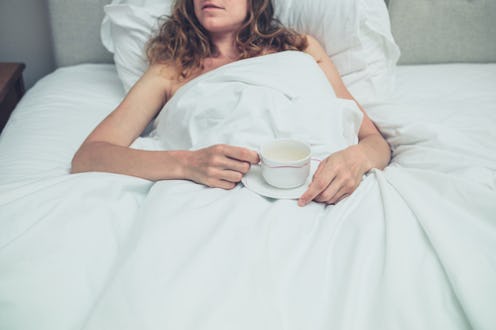Life
4 Signs Your Sleep Isn’t As Restful As It Should Be

Everybody wants good-quality sleep, the kind that involves long, uninterrupted rest that leaves us feeling refreshed and recharged when we wake. However, there's an unusual measure for sleep quality that's not widely known: sleep efficiency. Basically, it's a ratio of how much you're spending in bed to how much time you spend actually asleep. And it turns out that inefficient sleep is a particular issue that can have significant impacts on your routines, both during the daytime and at night.
Sleep efficiency is "the ratio of the total time spent asleep (total sleep time) in a night compared to the total amount of time spent in bed," says VeryWell Health. If you're spending loads of time in bed but not asleep, your sleep efficiency is likely low. Various factors can lower your percentage, including restless behavior in your sleep or lying there staring at the ceiling for ages without falling asleep. Keeping notes on nights when you can't seem to fall asleep can be useful to help figure out why this is the case, if you take this information to your doctor.
Here are some possible signs that your body is sleeping inefficiently and not maximizing its time under the bedsheets with sweet, sweet slumber.
1You Spend A Really Long Time Getting To Sleep
Sleep efficiency can be affected by a lot of different things. One particular factor, says the 2014 study, is "long sleep latency": spending a very long time to actually drift off to sleep, even if you sleep well afterwards. While you may believe that your overall sleep pattern is healthy because you appear to get your full quota of sleep hours per night, a long sleep latency period brings your efficiency numbers down, and also makes your sleep less restful.
Long sleep latency means your body's finding it difficult to bring down arousal levels to allow sleep to happen; it can happen because of exercising too late in the day or watching seriously heart-pounding stuff just before sleep. Save the terrifying horror films for earlier in the evening.
2You Have Restless Leg Syndrome
There's a strong link between restless leg syndrome, where people kick and move their limbs during the day and in their sleep, and inefficient sleep. If you're always jiggling your leg and can't seem to stop, particularly at night, you likely have RLS, and science indicates that might have a relationship with sleep inefficiency. A study of people with RLS in 2007 found that when they slept, they "showed numerous periods of waking, increased arousals, diminished sleep duration and sleep efficiency, and an elevated sleep fragmentation index". It's not clear whether this is cause or effect, but it appears to be pretty likely that if you have restless leg syndrome your sleep efficiency scores are probably low.
3You Have Energy & Tiredness Surges
It might not be obvious that you have an inefficient sleep pattern, but science suggests that it'll catch up with you over time. "An inefficient sleep may lead to feelings of tiredness and restlessness," says VeryWell Health. During the day, an inefficient sleeper may feel fatigued or experience unexpected energy patterns, because their rest is more disturbed and less refreshing than it could be.
4Your Sleep-Wake Patterns Are Disturbed
All of us have internal clocks that determine when we feel sleepy and when we wake up. In people who are experiencing inefficient sleep, those clocks are off, and feelings of sleepiness and waking go off-kilter as a consequence. "If a patient has fragmented, inefficient sleep, he/she is likely to suffer from daytime sleepiness and fatigue. The fragmented sleep does not lower the sleep drive during the night and as a result the person caries around an excessive amount of sleepiness during the day," Jerald H. Simmons MD, director of the Sadler Clinic Sleep Disorders Center, wrote.
However, that's not the only way in which inefficient sleep can disarrange the sleep-wake cycle. Inefficient sleep, writes Simmons, can create stress: "The stress and anxiety raises the wake drive and disturbs the balance with the sleep drive, and the person is unable to fall asleep." So the problem replicates itself, and sleep continues to be inefficient.
5
If you recognize any of these symptoms, it's entirely possible your sleep efficiency isn't what it could be, and it could be a good idea to talk to a GP or a sleep specialist to make the most of your nighttime hours.